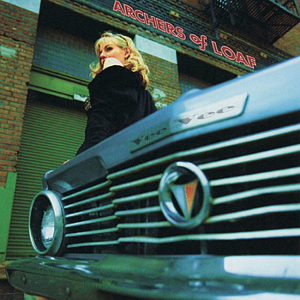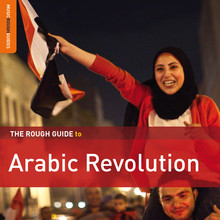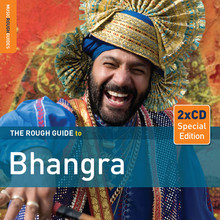
Vee Vee is the second studio album by the American indie rock band Archers of Loaf, released in March 1995 by Alias Records. The album received very positive reviews from critics.

The Rough Guide to World Music is a world music compilation album originally released in the United Kingdom in 1994. The first of the World Music Network Rough Guides World Music series, it was co-released with an eponymous reference book. The album features artists hailing from Africa, the Americas, Asia, and Europe. Artwork was designed by Impetus, and the compilation was produced by Phil Stanton, co-founder of the World Music Network.

The Rough Guide To The Music Of Afghanistan is a world music compilation album originally released in 2010. Part of the World Music Network Rough Guides series, the release covers a wide breadth of the music of Afghanistan on Disc One, and contains a "bonus" Disc Two highlighting the Ahmad Sham Sufi Qawwali Group. The album was compiled by Simon Broughton, editor of world music magazine Songlines, who also compiled The Rough Guide to the Music of Central Asia.

The Rough Guide To Desert Blues is a world music compilation album originally released in 2010. Desert blues refers to the music of the Mandinka and related nomad groups of the Sahara, who perform a style of music considered the root of the American Blues genre. This was first popularized in the West by Ali Farka Touré and has more recently been carried by a new wave of artists such as Tinariwen.

The Rough Guide To Psychedelic Africa is a world music compilation album originally released in 2012 featuring 1960s and 1970s African popular music. Part of the World Music Network Rough Guides series, the album contains two discs: an overview of the genre on Disc One, and a "bonus" Disc Two highlighting Victor Uwaifo. Disc One features three Nigerian tracks, two Guinean, and one each from Benin, Ethiopia, Tanzania, Senegal, Ghana, and Mali. The compilation was compiled by Dominic Raymond-Barker and Phil Stanton, co-founder of the World Music Network.

The Rough Guide To Voodoo is a world music compilation album originally released in 2013 featuring music inspired and influenced by the Voodoo religious tradition. Part of the World Music Network Rough Guides series, the album contains two discs: an overview of the genre on Disc One, and a "bonus" Disc Two highlighting Erol Josué. Disc One features four American tracks, two each from Brazil, Haiti, and Cuba, and one each from Trinidad and Benin. The collection was compiled by Dan Rosenberg and was produced by Phil Stanton, co-founder of the World Music Network.

The Rough Guide To Arabic Revolution is a world music compilation album originally released in 2013 featuring music relating to the contemporaneous Arab Spring revolutionary wave. Part of the World Music Network Rough Guides series, the album contains two discs: a compilation Disc One featuring protest songs ranging from traditional music to Arabic hip hop, and a "bonus" Disc Two highlighting Ramy Essam, whose song "Irhal" (Leave) is widely considered the anthem of the Egyptian Revolution.

The Rough Guide to the Music of Kenya and Tanzania is a world music compilation album originally released in 1996. Part of the World Music Network Rough Guides series, it focuses on the music of Kenya and Tanzania, two countries which share Swahili as a common language. The release was compiled by Phil Stanton, co-founder of the World Music Network. Artwork was designed by Impetus.

The Rough Guide to the Music of India and Pakistan is a world music compilation album originally released in 1996. Part of the World Music Network Rough Guides series, it focuses on the music of India and Pakistan, ranging from Hindi film songs to Hindustani classical music to Qawwali to folk. The release was compiled by Phil Stanton, co-founder of the World Music Network. Artwork was designed by Impetus and Anthony Cassidy.

The Rough Guide to the Music of Senegal is a world music compilation album originally released in 2013. Part of the World Music Network Rough Guides series, the release presents an overview of the music of Senegal on Disc One, and contains a "bonus" Disc Two highlighting Daby Balde. The album was compiled by Daniel Rosenberg and was produced by Phil Stanton, co-founder of the World Music Network. Daniel Rosenberg and Rachel Jackson wrote the sleeve notes, and Brad Haynes was coordinator and designer.

The Rough Guide to the Music of Canada is a compilation album originally released in 2003. Part of the World Music Network Rough Guides series, it gives a wide overview of the music of Canada. Though contemporary styles are represented, the album focuses on roots revivalism, ranging from the traditional music of the Maritimes and Quebec to First Nations music and tracks representing Canada's wide ethnic range. The release was compiled by Dan Rosenberg & Philly Markowitz.

The Rough Guide to Congo Gold is a world music compilation album originally released in 2008. Part of the World Music Network Rough Guides series, the release focuses on the soukous genre of the Democratic Republic of the Congo, with tracks from the 1960s to 90s. The compilation was produced by Phil Stanton, co-founder of the World Music Network. Martin Sinnock compiled the tracks and wrote the liner notes, and Brad Haynes & Marisa Lassman coordinated the project.

The Rough Guide To Acoustic Africa is a world music compilation album originally released in 2013 featuring acoustic music spanning Sub-Saharan Africa. Part of the World Music Network Rough Guides series, the album contains two discs: an overview of the genre on Disc One, and a "bonus" Disc Two highlighting griot Noumoucounda Cissoko. Disc One features artists hailing from Niger, Madagascar, the DRC, South Africa, Lesotho, Mozambique, Zimbabwe, Ghana, Cameroon, Mali, South Sudan, Sudan, Senegal, and Guinea. All but three tracks are guitar-based. The extensive liner notes were written by Daniel Rosenberg, and Phil Stanton, co-founder of the World Music Network, produced the album.

The Rough Guide to Dub is a world music compilation album originally released in 2005. Part of the World Music Network Rough Guides series, the release covers the roots of dub music, focusing on the period 1973-1980. Curation was performed by Steve Barrow, co-founder of the record label Blood and Fire, who also compiled The Rough Guide to Reggae and authored its companion book. Phil Stanton, co-founder of the World Music Network, produced the work.

The Rough Guide to the Music of Ethiopia is a world music compilation album originally released in 2004. Part of the World Music Network Rough Guides series, the release covers the music of Ethiopia, focusing largely on 1960s pop. The compilation was curated by Francis Falceto, who also produces Buda Musique's Éthiopiques series. Phil Stanton, co-founder of the World Music Network, was the producer.

The Rough Guide to the Music of Ethiopia is a world music compilation album originally released in 2012. Part of the World Music Network Rough Guides series, the release contains two discs: an overview of the music of Ethiopia—focusing mainly on 21st century pop—is found on Disc One, while Disc Two features dub-style musician Invisible System. The compilation was curated by Dominic Raymond-Barker and Phil Stanton, co-founder of the World Music Network, who was also the producer. It is the second compilation by this name: the first volume, focusing on music of the 1960s, was released in 2004.

The Rough Guide to the Music of Morocco is a world music compilation album originally released in 2012. Part of the World Music Network Rough Guides series, the release contains two discs: an overview of the music of Morocco—featuring such genres as Chaabi and Malhun—is found on Disc One, while Disc Two features the modern rural-urban fusion band Groupe Mazagan. The compilation was curated by Andy Morgan, former manager of Tinariwen and organizer of the Festival in the Desert. Brad Haynes and Rachel Jackson coordinated the project, and Phil Stanton, co-founder of the World Music Network, was the producer.

The Rough Guide to the Music of South Africa is a world music compilation album originally released in 1998. Part of the World Music Network Rough Guides series, the album spotlights the music of South Africa. Liner notes were written by Tom Andrews and Rob Allingham, a discographer and music historian specializing in South Africa. Phil Stanton, co-founder of the World Music Network, was the producer. This was the first of two similarly named albums: the second edition, featuring approximately half of the same artists, was released in 2007.

The Rough Guide to Greek Café is a world music compilation album originally released in 2010. Part of the World Music Network Rough Guides series, the release covers a wide breadth of the music of Greece on Disc One, from traditional to modern. Disc Two highlights Dimitris Mistakidis. The album was compiled by Marc Dubin, a journalist specializing in Greece for the past three decades. Brad Haynes coordinated the project, Laurence Cedar mastered the work, and Phil Stanton was the producer.

The Rough Guide to Bhangra is a world music compilation album originally released in 2010. Part of the World Music Network Rough Guides series, the release features bhangra, a form of Punjabi music. Disc One highlights artists from the 1980s to 2000s, and Disc Two features the British band Achanak. The album was compiled by DJ Ritu, a British-born musician, BBC Radio 3 host, and co-founder of Outcaste Records. Brad Haynes coordinated the project, Laurence Cedar mastered the work, and Phil Stanton was the producer. The release was preceded by a first edition a decade earlier.




















